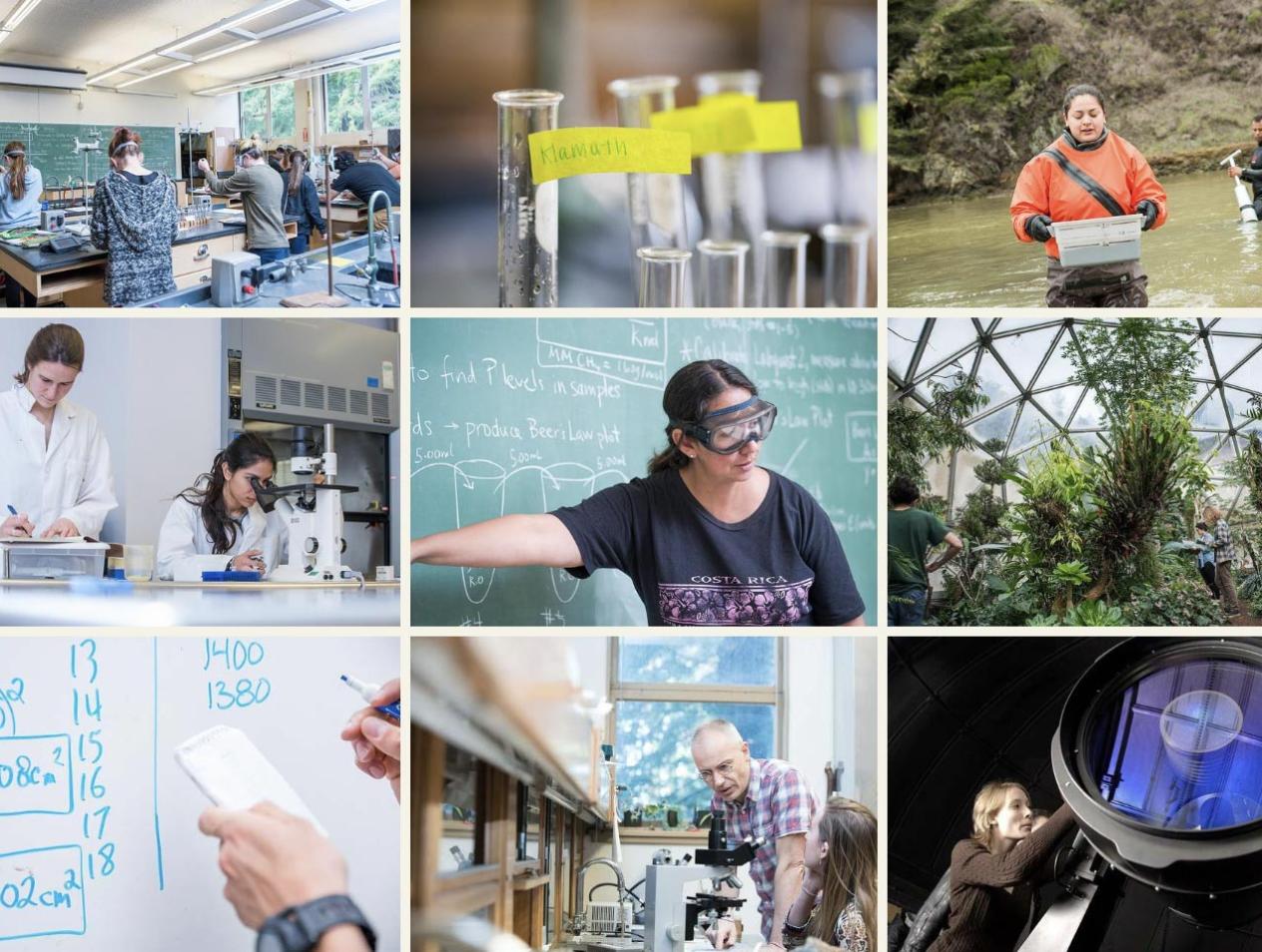Breadcrumb
Achievements
Find out what our students, faculty, and staff are being recognized for.
Hunter Harrill, Will Goldenberg
Forestry, Fire & Rangeland Management
Dr. Hunter Harrill (Forestry, Fire, and Rangeland Management) was invited to deliver a presentation titled, "Creating Immersive Field Trips and Assignments During COVID" for a panel session on Forest Operations Education at the COFE-FORMEC-IUFRO Division 3 International Conference of Forest Engineering, in Corvallis, Oregon, October 4-7th, 2022. His presentation featured the high quality virtual field trips that were filmed and produced by Humboldt alumni Will Goldenberg, that are now helping professors from other universities around the world, to educate their students. Dr. Harrill also served as a moderator for a panel session on Forest Operations Planning Issues and Opportunities.
Dennis Lindelof, Lisa Elconin, Huntington Paulson, Amanda Admire
Geology
On Saturday October 1st, the Geology Club officers, Dennis Lindelof, Lisa Elconin and Huntington Paulson, joined the Redwood Coast Tsunami Work Group and Humboldt Earthquake Education Center to participate in Pastels on the Plaza. Their design promoted the Great ShakeOut happening on October 20th at 10:20 am, and it highlighted the importance of earthquake and tsunami awareness and preparedness. Check out their design on the Arcata Plaza! We encourage everyone to sign up and participate in ShakeOut during Safety Week so you too can practice your earthquake and tsunami drill. Preparedness makes a difference!
Karolyn Fagundes, Hunter Harrill, Susan Marshall, Andrew Stubblefield, Han-Sup Han
Forestry, Fire & Rangeland Management
Karolyn Fagundes (Forestry, Fire, and Rangeland Management) was invited to deliver a presentation highlighting her Master's thesis research, titled, "Assessing Soil Disturbance from a Tethered Feller Buncher on Steep Slopes in Northern California." The presentation was part of a panel session on Environmental Impacts at the COFE-FORMEC-IUFRO Division 3 International Conference of Forest Engineering, in Corvallis, Oregon, October 4-7th, 2022.
Logan Hysen
Wildlife
Logan Hysen, M.S. student from the Department of Wildlife, was selected to be the recipient of a $1,000 scholarship given by the San Francisco Bay Area Chapter of the California Association of Environmental Professionals. The scholarship supports students pursuing a career in the environmental field. Logan is conducting research on environmental impacts on northern spotted owl for his thesis.
Hunter Harrill
Forestry, Fire & Rangeland Management
Dr. Hunter Harrill received a $100,000 grant from the U.S. Forest Service to conduct a study that will determine the size, scale, and capabilities of the logging industry in California. The main objective of the project is to survey the industry to quantify the number of crews that exist and their characteristics (e.g. capacity, employment, equipment, capabilities), and improve our understanding of their challenges, opinions, business outlook, and vision for the future. Findings will inform land managers about the potential for types of forest operations and available capacity in their respective area.
Logan Hysen, Danial Nayeri, Ho Yi Wan
Wildlife
In Summer 2022, Logan Hysen and Danial Nayeri, graduate students of the Wildlife Department, were awarded a $1,000 research grant from the California North Coast Chapter of the Wildlife Society. This grant will be used to conduct a pilot research on northern spotted owl prey species in recently burned forest landscapes. They will be conducting the research under the supervision of Dr. Ho Yi Wan.
Jeffrey Kane
Forestry, Fire & Rangeland Management
In an effort to address California's daunting wildfire challenges, Dr. Jeffrey Kane and the Humboldt Fire Resilience Institute recently acquired a $500,000 Cal Fire Workforce Development Grant. Through these funds, the institute, in partnership with local agencies and organizations, will work to develop and better integrate education, training, experience, and outreach opportunities for fire students, professionals, and community members within northwestern California. The major aim of this work is to enhance the qualified fire and fuels management workforce to help reach the ambitious but necessary fuel reduction targets for California in the coming years.
Alison O'Dowd
Environmental Science & Management
ESM Professor Alison O'Dowd received >$800,000 in grants and matching funds to do a 5-year food web study related to the removal of 4 large dams on the Klamath River. The study includes collaborators at the Karuk Tribe and UC Davis to look at food resources and diet of salmonids in tributary and mainstem sites on the Klamath River before, during and after dam removal. This research will explore the resiliency of culturally-important salmonids during high sediment loads released during dam removal.
Tara S. Caso and Robert W. Zoellner
Chemistry
Professor Emeritus Robert W. Zoellner and his former student, Tara S. Caso, have published a peer-reviewed article entitled "Thioacetone analogs of cyclic diacetone diperoxide (DADP), triacetone triperoxide (TATP), and tetraacetone tetraperoxide (4A4P): Structures and properties from density functional calculations" in the Journal of Undergraduate Chemistry Research 2022, 21, 54-59.
Alison O'Dowd
Environmental Science & Management
Dr. Alison O’Dowd received a grant from the California Wildlife Conservation Board to support research into salmonid food webs in the Klamath River. The project seeks to understand the food webs dynamics associated with Klamath Dam removal by examining the water quality, salmonid food resources and diet in the mainstem Klamath River and associated tributaries before, during, and after Klamath dam removal. Findings will inform management of fisheries and fish food resources associated with future dam removal projects. It will also advance the field of disturbance ecology by documenting the effects of a large-scale ‘planned’ disturbance.






